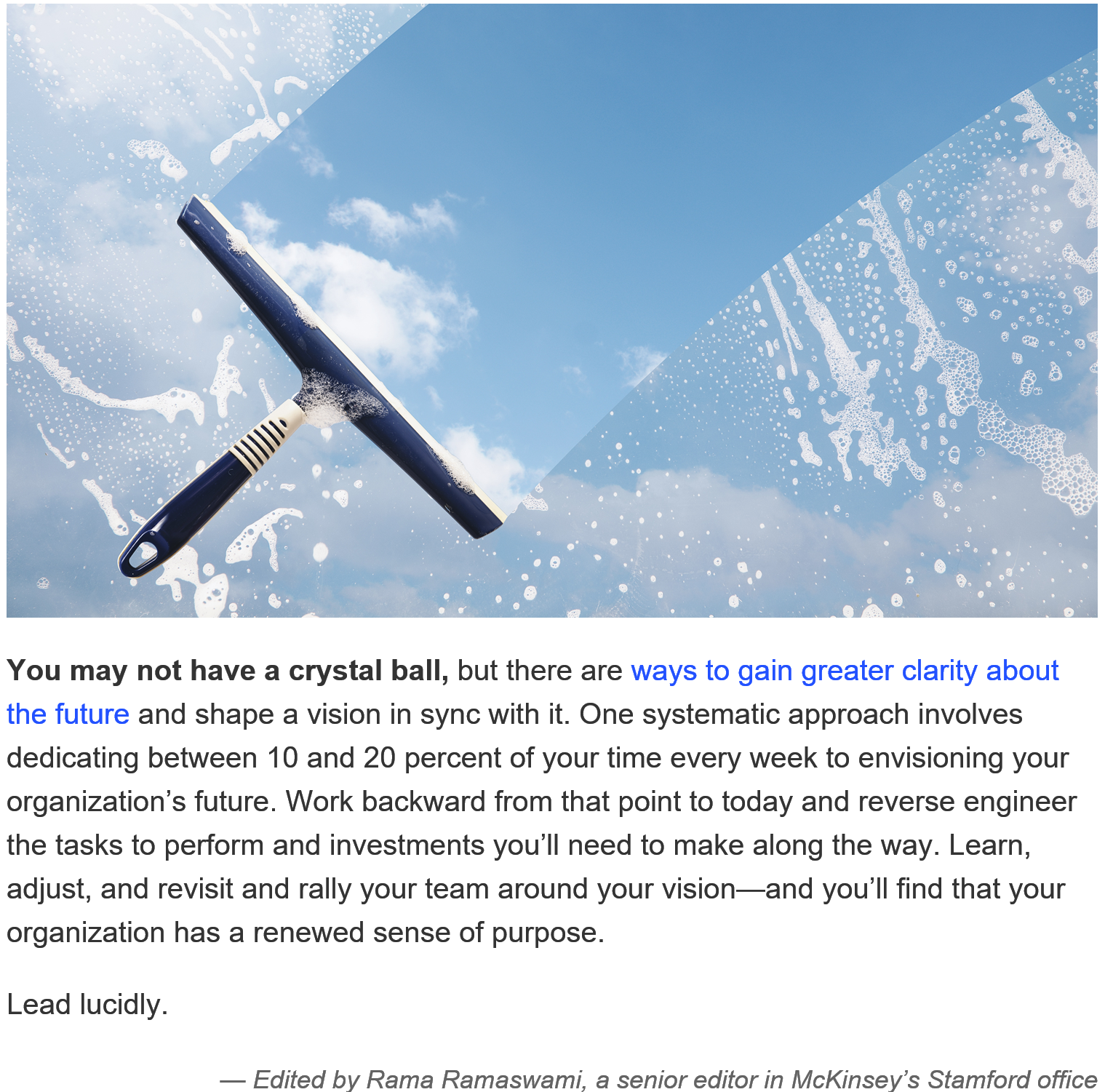Future Self
Ways to gain greater clarity about the future (Source: McKinsey)
The above is a snapshot I clipped from the latest Leading Off newsletter by McKinsey. I can swear by what has been said to be super true. It pretty much sums up my own approach at life and how I got here from where I was 30 years ago:
I spend a lot of time thinking. And planning. And then be flexible with what happens (because things are not always linear or go according to plan).
I envision my own future. When I was a kid, I envisioned myself as a class monitor and a head prefect. I ended up being those AND held several positions in school clubs too. When I was a young adult, I envisioned myself as a successful person working at what I love and do best. I worked my way up and ended up being an individual contributor where my role at work was custom-created. It’s flexible, paid very well, I worked from home (way before the Covid-19 situation) and in the office, and I got recognition for my work. It’s my dream job the way I envisioned it to be. Then, I envisioned myself retired young and financially free—this is where I am now.
I apply the 80/20 rule to pretty much everything I do. Choosing carefully the 20% of what I do and focus on will truly determine my success. This also means I forego 80% of the ‘non-essentials’ to focus on the 20% that will ‘get me there.’
I reverse-engineered (a lot) and still do. I look at the outcome I need to achieve and then I work backwards. Right now, I’m doing this mostly with my Swedish language study; for example, finding out the possible national exam dates and plan my study tactically. However, it’ll not possible if the school or teachers are not able to provide that information, so I’ll have to apply my best guess through research from other sources and work within that constraint or ambiguity. Don’t get me wrong, I’m not trying to just pass an exam. I’m trying to do the best preparation to yield the best result, AND speak Swedish like a pro when it’s time. Meanwhile, I’ll put on my program/project manager/analyst hat...
I invest in myself. A lot. I spend mostly on books, education, and lots of hours experimenting. What I didn’t get to do when I was young due to poverty; for example, getting my degree, I made up with hard work, patience, and resourcefulness. When money was no longer an issue, I went all in—I created and curate my personal library with books and magazines I love, and invested in courses and certifications that will boost my profile. The ROI is great.
I course-correct along the way. As I said earlier, things don’t always go the linear way, and sometimes the investments I made proved to be unsuitable or plain wrong. There will be sunk cost. It’s not the end of the world; I had some regrets but because I love case studies so much, I turned all these (unfortunate) series of events into a neat bundle of personal case studies. Most of the time, after assessment and some tweaks, the problem is solved. Self-awareness and the willingness to either let go (when it’s a lost cause) or admit when I’m wrong are important for course-correction to happen.
I need support. This is where family, friends, and the people you work with including acquaintances are important. They are my team. My achievements would not have been possible without their belief and support. I understand this very well because there will always be people who don’t (or don’t want to) support or believe in you. When someone do put their faith and belief in you, don’t squander that.
So, if I were to personalize the McKinsey excerpt above, here’s how it’ll read:
I may not have a crystal ball, but there are ways to gain greater clarity about the future and shape a vision in sync with it. One systematic approach involves dedicating between 10 and 20 percent of my time every week to envisioning my future self. Work backward from that point to today and reverse engineer the tasks to perform and investments I'll need to make along the way. Learn, adjust, and revisit and rally my team around my vision--and I'll find that myself have a renewed sense of purpose.
Lead (myself) lucidly.
